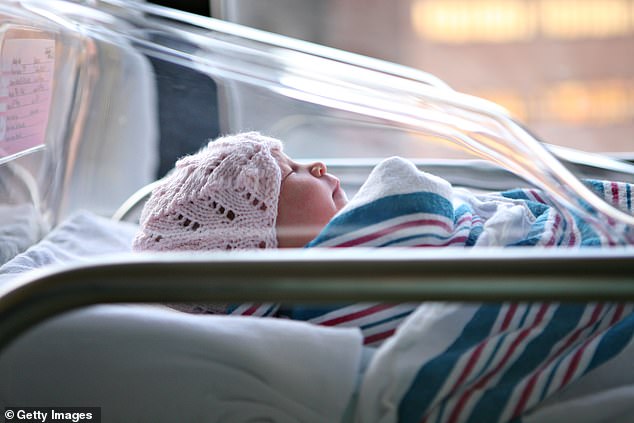Babies born during the COVID-19 pandemic were more likely to have shorter hospital stays, but there was no change in the risk of readmission, a new study suggests.
Researchers from the Children Hospital’s of Philadelphia found that 28.5 percent of all newborns had short hospitals stays pre-pandemic compared to 43 percent during the pandemic.
However, the share of infant rehospitalizations within a week of being discharged did not increase last year.
The team says the findings show say that despite the change in hospital policies, it did not seem to worsen outcomes for babies.

A new study finds 43% of babies born during the pandemic had short hospital stays compared to 28.5% of babies born pre-pandemic (file image)
Prior to the pandemic, it was not uncommon for babies to remain in the hospital for a week before being discharged.
However, after COVID-19 hit, many hospitals changed their policies so that healthy babies could not remain in hospital for more than two or three days for fear they would contract the virus.
‘The COVID-19 pandemic forced hospitals to change policies and procedures around childbirth, including expediting discharges for healthy term infants, which provided a natural experiment that allowed us to compare outcomes before and during the pandemic,’ said first author Dr Sara Handley, an attending neonatologist with the division of neonatology at CHOP, in a statement.
‘These findings suggest that shorter hospital stays after birth among healthy term infants may be safe with respect to infant rehospitalization, though examination of additional outcomes is needed.’
For the study, published in the journal Pediatrics on Tuesday, the team analyzed data from an application that aggregates electronic health records.
They looked at 35 health systems and and compared the length of hospital stays before (March to August in 2017, 2018 and 2019) and during the pandemic (March 2020 to August 2020).
A short stay was defined as being two nights or less following a vaginal birth and three nights or less following a Cesarean section (C-section).
Researchers also looked at rates of infants being readmitted to hospitals within a week of discharge pre-pandemic and during the Covid-era.
Of the approximately 202,000 infants who were examined, of which 57,000 were born during COVID-19, they found short-term hospitalizations were 1.5 times more common during the pandemic.
Prior to the pandemic, 28.5 percent of babies had a short hospital stay, which increased to 43 percent during COVID-19.
For vaginal births, the rate increased from 25.6 percent of short stays pre-Covid to 39.3 percent post-Covd.
For C-section births, 40.1 percent of newborns had short hospitals says prior to the pandemic compared to 61 percent after the pandemic.
However, infant rehospitalization did not increase and, in fact, slightly declined from 1.2 percent prior to Covid to 1.1 percent during Covid.
‘These findings suggest that shared decision making between families and clinicians, as was likely the case during COVID-19, resulted in safe earlier discharge with respect to infant hospitalization,’ said senior author Dr Heather Burris, an attending neonatologist with the division of neonatology at CHOP in a statement.
‘Further study of mitigating factors such as home services, telemedicine visits, and other supports that may have changed during the pandemic are warranted.
‘Additionally, investigation of the pandemic’s impacts on other infant and maternal outcomes are critical before changing birth hospitalization policy.’
Source link : https://www.dailymail.co.uk/health/article-10081701/Babies-born-COVID-19-pandemic-1-5-times-likely-shorter-hospital-stay.html











